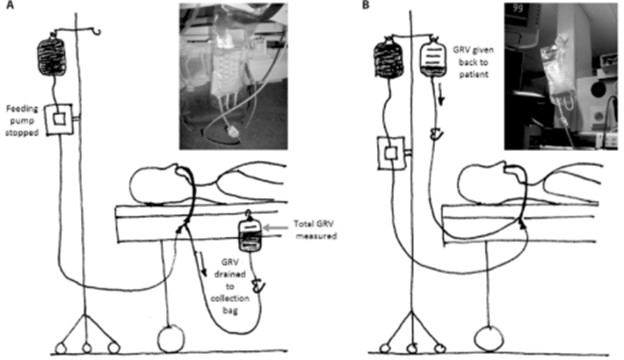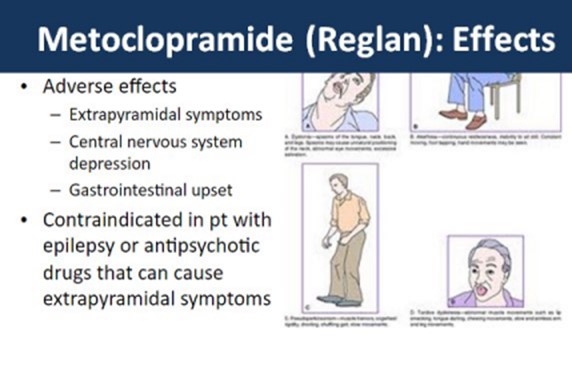A nurse is caring for a client who receives intermittent enteral feedings through an NG tube. Before administering a feeding, the nurse should measure the gastric residual for which of the following purposes?
To confirm the placement of the NG tube
To determine the client's electrolyte balance
To remove gastric acid that might cause dyspepsia
To identify delayed gastric emptying
The Correct Answer is D
The nurse should measure the gastric residual before administering a feeding to identify delayed gastric emptying. Gastric residual refers to the volume of formula or contents remaining in the stomach from the previous feeding. Measuring gastric residual helps assess how well the client's stomach is emptying and can indicate if there is delayed gastric emptying.
By measuring gastric residual, the nurse can:
● Determine if the stomach has adequately emptied from the previous feeding. ● Assess the client's tolerance to enteral feedings.
● Detect signs of delayed gastric emptying, which can be indicative of gastrointestinal motility issues or other complications.
● Adjust the feeding rate or make other modifications to the enteral feeding plan based on the amount of residual volume.

Confirming the placement of the NG tube is typically done using other methods, such as an X-ray, pH testing, or auscultation of air insufflation. Gastric residual measurement primarily serves the purpose of assessing gastric emptying, rather than confirming tube placement.
While electrolyte imbalances can be monitored in the overall care of a client receiving enteral feedings, measuring gastric residual specifically focuses on assessing gastric emptying and feeding tolerance, rather than determining the client's electrolyte balance.
Removing gastric acid that might cause dyspepsia is not the primary purpose of measuring gastric residual. Gastric residual measurement aims to evaluate the volume of the previous feeding and assess gastric emptying, rather than focusing on dyspepsia specifically.
Nursing Test Bank
Naxlex Comprehensive Predictor Exams
Related Questions
Correct Answer is A
Explanation
Metoclopramide is a medication commonly used to treat gastrointestinal disorders such as gastroesophageal reflux disease (GERD). While it is generally well-tolerated, it can have some adverse effects. Sedation is one of the common side effects of metoclopramide. It can cause drowsiness, dizziness, and a feeling of tiredness in some individuals. Therefore, the nurse should monitor the client for any signs of sedation or excessive drowsiness, especially when the client starts taking the medication or when the dose is increased.

Hypertension: Metoclopramide is not known to cause hypertension (high blood pressure) as a common side effect. In fact, it may have a mild hypotensive (blood pressure-lowering) effect in some individuals.
Urinary retention: Metoclopramide does not typically cause urinary retention. Instead, it can enhance gastrointestinal motility and increase the frequency of bowel movements.
Blurred vision: While visual disturbances are rare adverse effects of metoclopramide, blurred vision is not a commonly reported side effect. However, other visual disturbances like oculogyric crisis (involuntary rolling back of the eyes) have been reported in rare cases. Nevertheless, monitoring for blurred vision specifically is not a priority when administering metoclopramide.
Correct Answer is B
Explanation
Cimetidine is a medication known as a histamine H2 receptor antagonist, commonly used in the treatment of peptic ulcer disease. It works by reducing the production of stomach acid. When teaching a client about cimetidine, it is important to inform them about the timing of taking other medications, specifically antacids.
Antacids, which are used to neutralize stomach acid, can interfere with the absorption of cimetidine if taken simultaneously. Therefore, it is generally recommended to wait at least 1 hour after taking cimetidine before taking an antacid. This allows sufficient time for the cimetidine to be absorbed and start working effectively before neutralizing stomach acid with an antacid.

Whether you are a student looking to ace your exams or a practicing nurse seeking to enhance your expertise , our nursing education contents will empower you with the confidence and competence to make a difference in the lives of patients and become a respected leader in the healthcare field.
Visit Naxlex, invest in your future and unlock endless possibilities with our unparalleled nursing education contents today
Report Wrong Answer on the Current Question
Do you disagree with the answer? If yes, what is your expected answer? Explain.
Kindly be descriptive with the issue you are facing.
